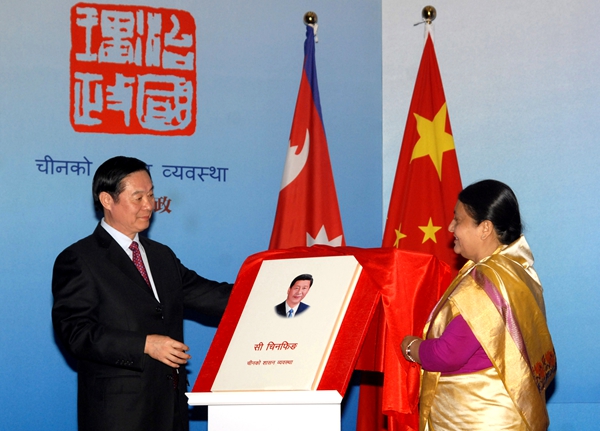Xi's book is an Intellectual Bridge with Nepal
china.org.cn / chinagate.cn by Ritu Raj Subedi, February 3, 2017 Adjust font size:
|
|
|
Nepal’s President Bidya Devi Bhandari (right) and Liu Qibao, a Political Bureau member of CPC Central Committee (CPCCC) and head of CPC Central Committee's Publicity Department, release the book "The Governance of China" by Chinese President Xi Jinping during the launching of the book at Shital Niwas, Kathmandu on 18 December, 2016. [Courtesy of Ritu Raj Subedi] |
"The Governance of China" by Chinese President Xi Jinping has been published in Nepali, with a view to inform Nepalese readers about China's governance system and the vision of its president. The Nepal-China Study Centre, in collaboration with China's Foreign Languages Press, published the book that has already been translated into over 11 languages.
Nepal's President Bidya Devi Bhandari released the book at a special ceremony at Shital Niwas, Kathmandu on Dec. 18, 2016. Liu Qibao, a member of the Political Bureau of the CPC Central Committee (CPCCC), and minister of the CPCCC Publicity Department attended the function.
"It is my perception that the book, besides providing in-depth information about China's governance system, helps readers to understand the Chinese leader's dreams and world views," said President Bhandari.
The book was first published in English in 2014. It was compiled by the State Council Information Office of China, the CPCCC Party Literature Research Office and China International Publication Group. It has been translated into French, Russian, Cambodian, Arabic, Spanish, Portuguese, German and Japanese. The Nepali edition is the latest one.
It consists of President Xi's major works from Nov. 15, 2012, to Jun. 13, 2014. Divided into 18 chapters, the book includes his 80 speeches, talks, interviews, instructions and communications. Each work is accompanied by relevant notes about China's political and social history and culture. It also contains 45 photos that offer insights into various stages of Xi's life and works.
"President Xi's book in Nepali language has laid the foundation for the 21st century's intellectual bridge over the Trans-Himalayan horizon," said Dr Upendra Gautam, NCSC general-secretary.
Dr Gautam noted that intellectual alignment in the form of harmonizing development strategies of both countries was a prerequisite for materializing infrastructures for physical connectivity between them. Xi's book will help fulfill this mental gap in the form of governance.
With Xi's rise to power, China's global position has increased stratospherically. It has become the world's second largest economy and its role in dealing with the world's strategic and critical matters has increasing importance.
Thus, it has become imperative to understand China's socio-economic, political and administrative system. Besides, we have been largely dependent on Western media and literature to learn about the reality of China despite it being an immediate neighbor. In many cases, it has been perceived that the Western interpretations and judgments of things happening in China have been biased because its socio-political system differs from the former.
Against this backdrop, Xi's book can be highly resourceful in gaining first-hand knowledge about the most populous nation, its future development plans as well as its diplomacy with its neighbors and friendly nations.
It enables the Nepalese politicians, intellectuals and policy makers to correctly understand the Chinese dream, its governance system and socialism with Chinese characteristics. It profusely elucidates farsighted development planning - the Belt and Road initiative - a wide-ranging development framework launched by Xi himself. This is his one of the win-win proposals aimed at achieving peaceful development at home and abroad. The book provides a blueprint for China's policies related to energy, technology, environment, security, and international cooperation.
All-round and deeper-level reform, developing a law-based country and reaching all-round, cooperative and sustainable development characterize the Chinese governance system espoused by Xi.
In his write-up published on China.org.cn, professor Wang Yukai of the National School of Administration says that Xi's governance vision contains three integration features - integral idea, integral plan and integral strategy.
He says that governing with an iron rule, serving the people, fairness and justice and independence form the framework of above ideas. The massive anti-corruption drive that caught both "big tigers and flies" seeks to ensure good governance, justice and fairness.
Nepal and China share political, social, economic and cultural ties since time immemorial. The snow-capped mountains that straddle the border of two nations symbolize their inseparable friendship and bond. As a close and intimate neighbor, China has always respected the sentiments of Nepalese as well as Nepal's sovereignty and right to self-determination.
Xi's foreign policies towards neighbors, as expressed in the present book, attest this fact. He notes that China's diplomacy with its neighbors is based on friendship, sincerity, reciprocity and inclusiveness.
"China should treat the neighboring nations as friends and partners," Xi writes.
He further says: "China and neighboring countries are like relatives, whereby frequent mutual visits make them closer. When getting along with neighbors, we need to treat them sincerely and kindly, and share interests with them."
Given this commitment to enhance amicable relations with neighbors, Nepal-China relations are expected to reach a new height during the tenure of President Xi. And his book bears testimony to this hope and faith.
Ritu Raj Subedi is an associate editor of The Rising Nepal.
